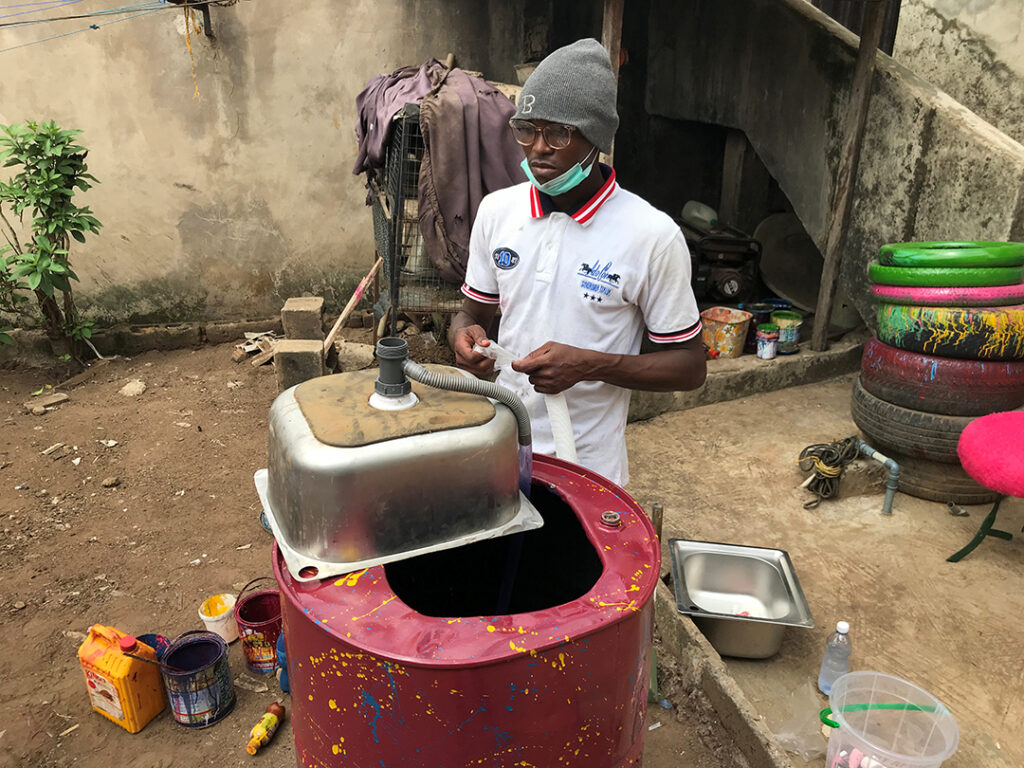ADF STAFF
Working under the blazing sun, Bamigbose Adams drove a chisel into the top of a recycled metal drum. Within minutes, the Nigerian artist had carved a rectangular hole, just the right size for a sink.
The drum soon was transformed into one of hundreds of pedal-operated hand-washing basins Adams has made during the COVID-19 pandemic. The basins have been sold to hospitals, schools, businesses and households to promote hand-washing — essential to preventing disease.
Adams’ creative and entrepreneurial interests were piqued when he noticed large numbers of discarded metal drums in dump sites around Lagos.
“What can I come up with to kind of help the situation?” Adams, who runs Above Ground Level Artistry, told Reuters. “So, I got the first drum and tried it out and posted it online, and people started requesting it.”
The basins often are painted in vibrant colors. They can be can delivered nationwide and sell for about 30,420 naira which is about $80.
“When we started and the demand was at its peak, we fabricated at least 10 stations every day,” Adams, who earned an economics degree at the University of Uyo, told ADF in an email. “But now demand has dropped drastically. Before COVID, we are recyclers and we’ve done a lot of recycled products. We’ve started post-COVID production with the same drum [to make] barbecue grills.”
The company also makes eco-friendly tables, mirrors and other furniture from discarded tires. Emmanuel Ogbu, who works with Adams, said they have conducted online training for others interested in transforming trash into virus-fighting tools.
“In the future, we are looking at having a workshop where Nigerians can come and learn and see what they can do with things around them,” Ogbu told Africanews.
Suleiman Adamu, Nigeria’s minister of water resources, said the country has made progress in its efforts to ensure that its residents have access to water.
“Most notably in the number of households accessing basic water services — we cannot rest on our laurels,” Adamu said on UNICEF’s website. “We will be looking at our overall strategy, based on these findings [by UNICEF], to see how we can strengthen all areas of the water, sanitation and hygiene in Nigeria.”
Innovations such as the hand-washing stations have highlighted Nigeria’s response to the pandemic.
In October 2020, Nigerian researchers developed an easy-to-use COVID-19 test kit that delivers results in minutes. The kits cost $25, cheaper than the $130 kits used previously.
“The test is something you can carry comfortably and use as a [do-it-yourself] testing kit,” Dr. Chika Onwuamah, a biologist at the Nigeria Institute of Medical Research, told The Telegraph. “You can test 32 people in one hour with one pack.”
In May 2020, Nigeria’s Air Force Institute of Technology unveiled locally made ventilators to address a shortage of the machines that help people breathe.
“The ventilators will go a long way to help not only coronavirus patients, but also others with respiratory illnesses,” Capt. Osichinaka Ubadike told the BBC.

